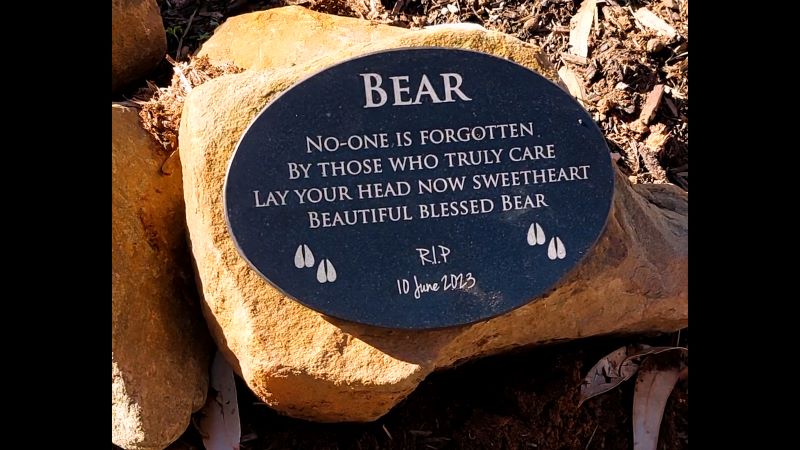News & Media > Investigator Diaries > Bear's Story
Her voice was the first thing I noticed when I walked through the gate. A piercing but soft cry, splitting the cold night. It had been raining on the almost two-hour drive from Adelaide, the sheets of water making us more cautious as we navigated the dark roads. But just before we parked, the rain stopped, and an eerie silence settled in as we crossed the fields for the final time.
After a week of installing at Snowtown we had gone back to retrieve our cameras. At that point, we didn’t know what we had captured and were yet to see the horrific violence that occurred behind the slaughterhouses doors. But the pools of blood that remained on the floor every night we entered and the piles of heads and entrails carelessly thrown into the back of a ute parked outside had given us the sickening expectation that what we saw would be horrifying. What we didn’t expect was her.
Her little bleats led me closer and closer until I was standing over the fence of a pen filled with goats, looking out anxiously into the night. She was tiny, soaking wet and shaking as she called for her Mum, who stood just meters away. “Oh god, I think she’s a newborn,” I said, the despair obvious in my voice. I was quickly joined by my fellow investigator and we both stood silently, trying to think through our options. “I wish we could take her,” I said and my friend nodded, leaning his head against the fence.
Here’s the thing, one of the reasons we rarely rescue, even though we want to take all the animals we see in farms and slaughterhouses away with us, is because sanctuaries are already stretched far too thin, supporting too many animals with too few resources. Rescuing without a home is a guarantee of more work and more money for a sanctuary, especially when there’s the chance that the animal saved might need veterinary treatment. But, at the same time, as we looked down on her tiny form, the thought that we could do nothing was heartbreaking.
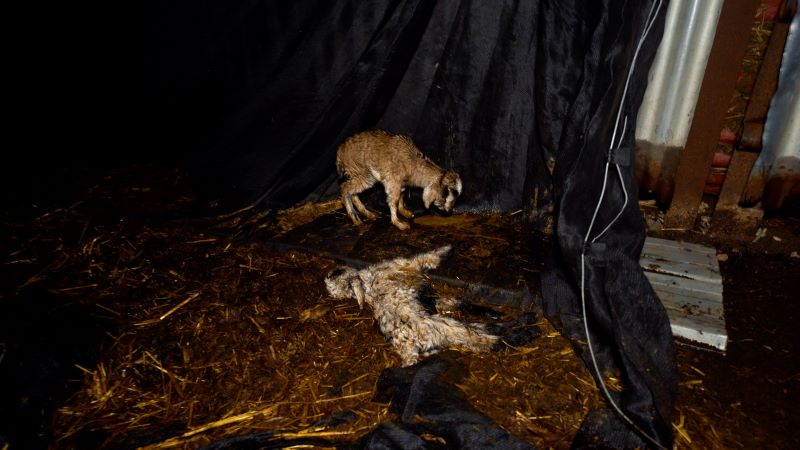
We stood there for minutes as a train thundered past, lighting up the fields and making conversation impossible. Then, just as I was about to pull myself together, seal off my heart and move away, my friend stood up straight and looked at me. “Fuck it, we’ll come and get her on our way out.”
I couldn’t stop smiling as we retrieved our cameras, knowing that we would be taking someone out, saving someone from a short life of suffering and a violent death. But, as we went back to get her, we realised her situation was worse than we had first thought. She looked pitiful, barely able to stand and shivering intensely. At her feet lay the body of another goat, likely born at the same time, maybe even from the same mum. That one had already succumbed to the weather and what was likely a traumatic birth.
Their mum would have been herded and captured before being forced onto a truck and driven for hours or days without food and water. We didn’t know how long she had been in the pens but, from the last investigation at Snowtown, we knew that goats would often be left outside for days at a time, with no access to food or shelter.
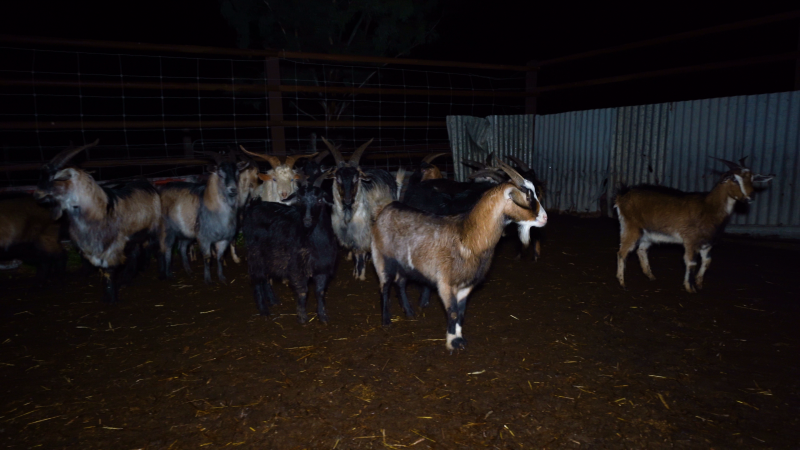
Looking down at the little shape in front of us, it seemed unlikely that she would survive the night. But I bundled her up and scaled the fence, holding her as gently as possible. She was icy cold as I held her to my body and so tiny, barely weighing anything at all. She cried out briefly as I jostled her jumping down from the high wall of the pens, then was silent as we walked across the paddocks. As we reached the car we cranked up the heat and wrapped her in a jacket until only her head poked out, hoping that we could banish the chill that would have seeped deep into her bones.
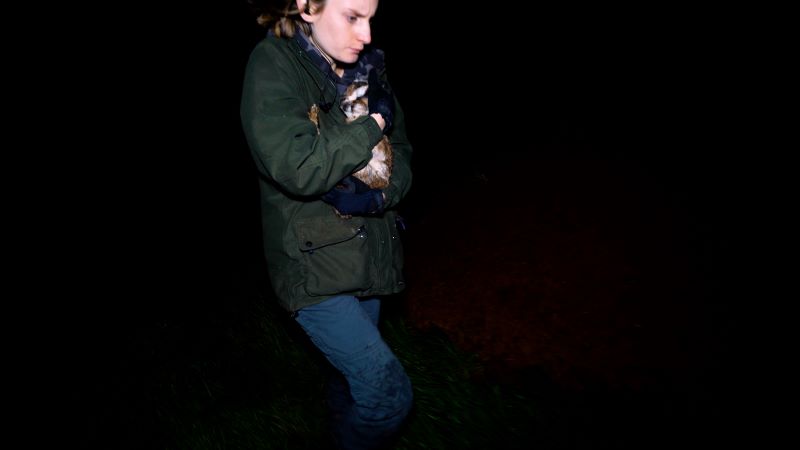
The whole trip home, she barely made a sound and I checked repeatedly to make sure she was still breathing, placing my hand in front of her nose to feel the gentle brush of air against my fingers. Occasionally she would stir, before burrowing back deeper into the warmth of the jacket and letting out a sigh. I fell asleep holding her closely to me and hoping that she would survive. As we parked at our accommodation, I told the others the name I had given her as soon as I had seen her: Bear.
That night, we tried to give her some food and make her as comfortable as possible in a basket filled with towels. I slept next to her on the couch, waking at some points to make sure she was alive before collapsing back into sleep. We had intended to go and get her supplies that morning then start looking for someone who might take her in, but, luckily, the first place we contacted responded in the early hours of the morning saying that they would accept her and that we could drive her to them that morning. After a brief trip to pick up formula and another attempt to feed her, we set out.
This time, she was more alert, looking around and resting her head on my hand. She had stood up briefly at our accommodation and drank some milk, so we had hope that she would be ok. As we drove her to the sanctuary, we talked about her future, pointing out the sheep, goats and lambs who she would be living with and laughing as we imagined her climbing on rocks and playing with new friends. We left her in the best place we could imagine, with kind people who would do everything they could to help her.
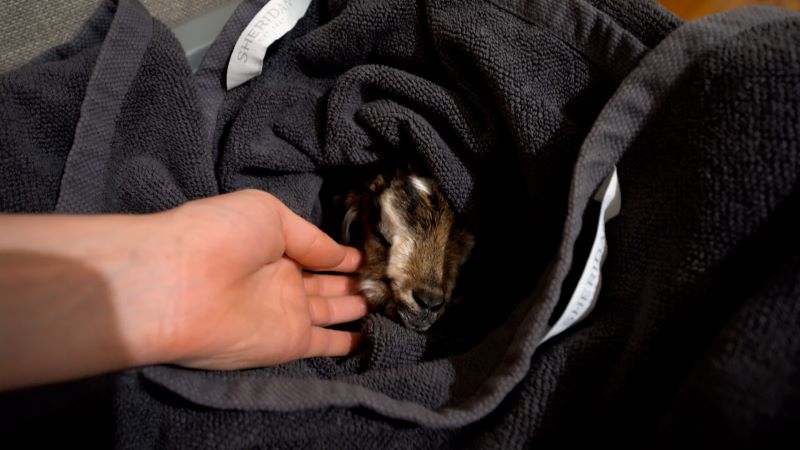
The next day, they messaged to let us know that she was struggling and that they were doing everything they could to help her survive. The day after that she was gone.
It had been too cold, she had been too small and her little body just couldn’t take it. Maybe if we had found her earlier or if her mum had more milk to give, she would have made it. Maybe if we had been more experienced at caring for goats, or if it hadn’t been the middle of the night, or if it had been warmer or less rainy, she would have survived. Those maybes tortured us as we asked if there was anything else we could have done for her, our little Bear who so briefly brought a small sliver of joy into a time filled with darkness, death and horror.
But, at the same time, when we thought about the way we found her, we knew that even if we had known she wouldn't survive, we would have done the exact same thing. At least this way she had a couple of days of warmth and love. At least she died surrounded by people who cared about her and remembered her, rather than freezing to death on the filthy floor of a slaughterhouse holding pen, or beaten to death and thrown into a pit, by an industry that saw her as nothing more than waste.
For me, I’ll never forget the protective urge I felt as soon as I saw her fragile body and the words I whispered as I gathered her in my arms. “You’re safe now, I won’t let anyone hurt you.”
I wish that we could have protected her from an uncaring world. I wish that we could save them all.
We will never forget you Bear.
